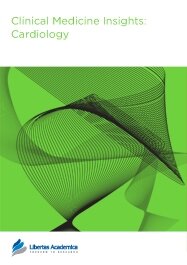

Publication Date: 01 Dec 2010
Type: Review
Journal: Clinical Medicine Insights: Cardiology
doi: 10.4137/CMC.S4323

The thienopyridine antiplatelet agent clopidogrel is an effective drug for the prevention of vascular events. However, data has accumulated over time to suggest it is prone to significant interpatient variability. While there are several factors that contribute to this, one of the most important is variability in forming the active metabolite necessary for clopidogrel function. Several enzymes are involved in formation of this metabolite, and two, CYP2C19 and P-glycoprotein, appear to have alleles that both occur frequently in the population and have a clinically significant impact. Patients carrying these alleles can be identified, but it remains to be determined if this information is necessary or sufficient for risk stratification. Furthermore, if patients with high-risk alleles are identified, it is unclear how treatment should be adjusted.
PDF (576.67 KB PDF FORMAT)
RIS citation (ENDNOTE, REFERENCE MANAGER, PROCITE, REFWORKS)
BibTex citation (BIBDESK, LATEX)
XML
PMC HTML
I am impressed by the efficiency at each step of submission in the journal. Based on the first-hand experience, I am confident that this journal will have a great future, and the impact factor will rise rapidly.

All authors are surveyed after their articles are published. Authors are asked to rate their experience in a variety of areas, and their responses help us to monitor our performance. Presented here are their responses in some key areas. No 'poor' or 'very poor' responses were received; these are represented in the 'other' category.See Our Results
Copyright © 2013 Libertas Academica Ltd (except open access articles and accompanying metadata and supplementary files.)
FacebookGoogle+Twitter
PinterestTumblrYouTube